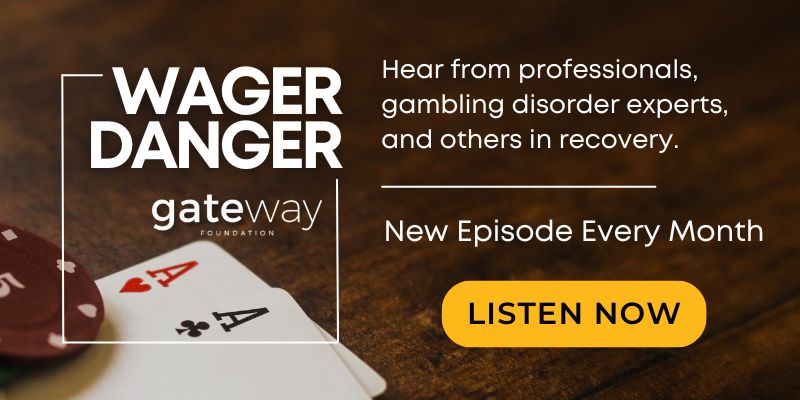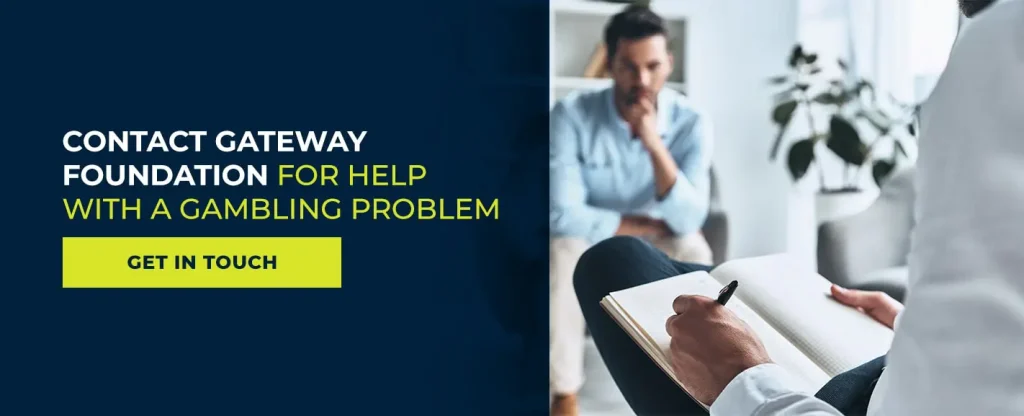- Jan 12
- AddictionAddiction TherapyTreatment

If you suspect a loved one has a gambling addiction, whether they are a close friend, family member, spouse, or child, it’s crucial they get help. Gambling addiction, also known as a gambling disorder, problem gambling, or compulsive gambling, is a progressive disease that can affect all ages and genders. Like any addiction, a gambling disorder can create significant problems in a person’s life, affecting their job, relationships, and mental health. Sometimes the consequences of a gambling disorder are devastating.
Fortunately, a gambling disorder is treatable, and you can encourage your loved one to get the help they need. Although you can’t make your friend or family member change, your love, and support can go a long way toward helping them overcome addiction.
The first step to helping someone recover from gambling addiction is to learn more about the disorder and what it looks like. Understand the signs to look for and learn tips for helping your loved one get their life back.
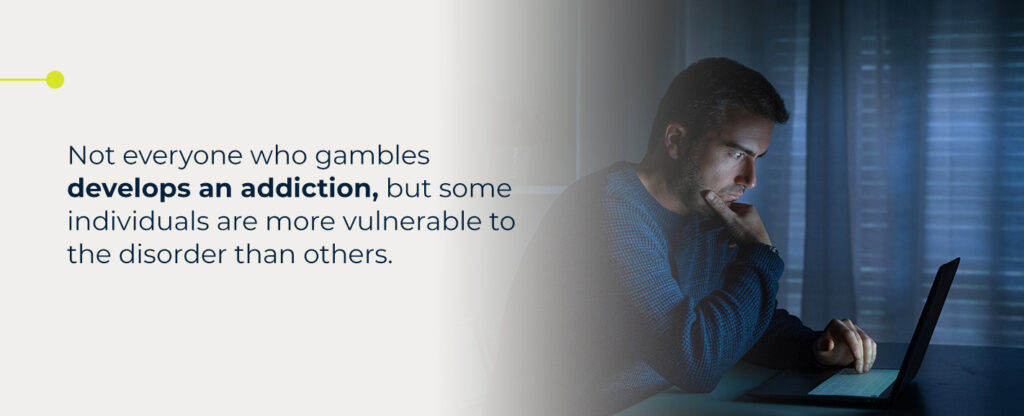
Understanding Compulsive Gambling
Gambling disorders can slowly progress over time or develop as soon as someone places their first bet. As the disorder progresses, the person might gamble more often and bet higher amounts. The more they bet, the more they might lose and need to try to win back.
Not everyone who gambles develops an addiction, but some individuals are more vulnerable to the disorder than others. Although scientists don’t know the exact cause of compulsive gambling, many different factors can contribute to the addiction, including biological, genetic, and environmental factors.
No matter the cause, it can be hard to understand why a loved one continues to gamble even though it causes problems. When someone has a gambling addiction, they cannot resist their urge, despite its negative consequences. This overwhelming desire to gamble can lead the person to deplete their savings, steal from friends and family, lie to those they love, and neglect their responsibilities.
As a result of their behavior, the person is left feeling stressed, depressed, guilty, angry, or anxious. They may believe that they can win back their losses if they gamble again or at least experience a temporary high. Once a person is addicted to gambling, it can be a hard cycle to break.
A gambling disorder is very similar to a substance use disorder. Like drugs or alcohol, gambling activates the brain’s reward system, leading someone to crave the activity repeatedly and develop an addiction. For some compulsive gamblers, gambling isn’t just about winning money. Instead, it provides an escape and a way to enter a “zone.”

Recognize the Signs of Problem Gambling
Although a gambling disorder may not always show obvious signs, there are still ways to tell if your loved one needs help. According to the Diagnostic and Statistical Manual of Mental Disorders (DSM-5-TR), a person with a gambling disorder will show four or more of the following signs within 12 months:
- A need to gamble with an increasing amount of money to reach a desired level of excitement
- Restlessness, boredom, or irritability when trying to stop or reduce gambling
- Repeated attempts to stop, decrease or control gambling with no success
- A persistent preoccupation with gambling, which may appear as an inability to concentrate
- Gambling when feeling anxious, depressed, stressed, helpless, or guilty
- Returning to gambling after losing money to try to win back what was lost
- Lying about their spending to hide how involved they are with gambling
- Problems with jobs, relationships, financial responsibilities, or school due to gambling
- A reliance on others to solve financial problems caused by gambling
Since someone with a gambling problem might hide their behavior, you may not know how much of a problem they have. If you suspect they have an addiction, look for any signs that their physical health or financial situation has changed. For example, the person might appear more tired, withdrawn, or depressed if they put all of their energy and time into gambling and neglecting their physical needs. Or, they may ask you for loans for unexplained reasons.
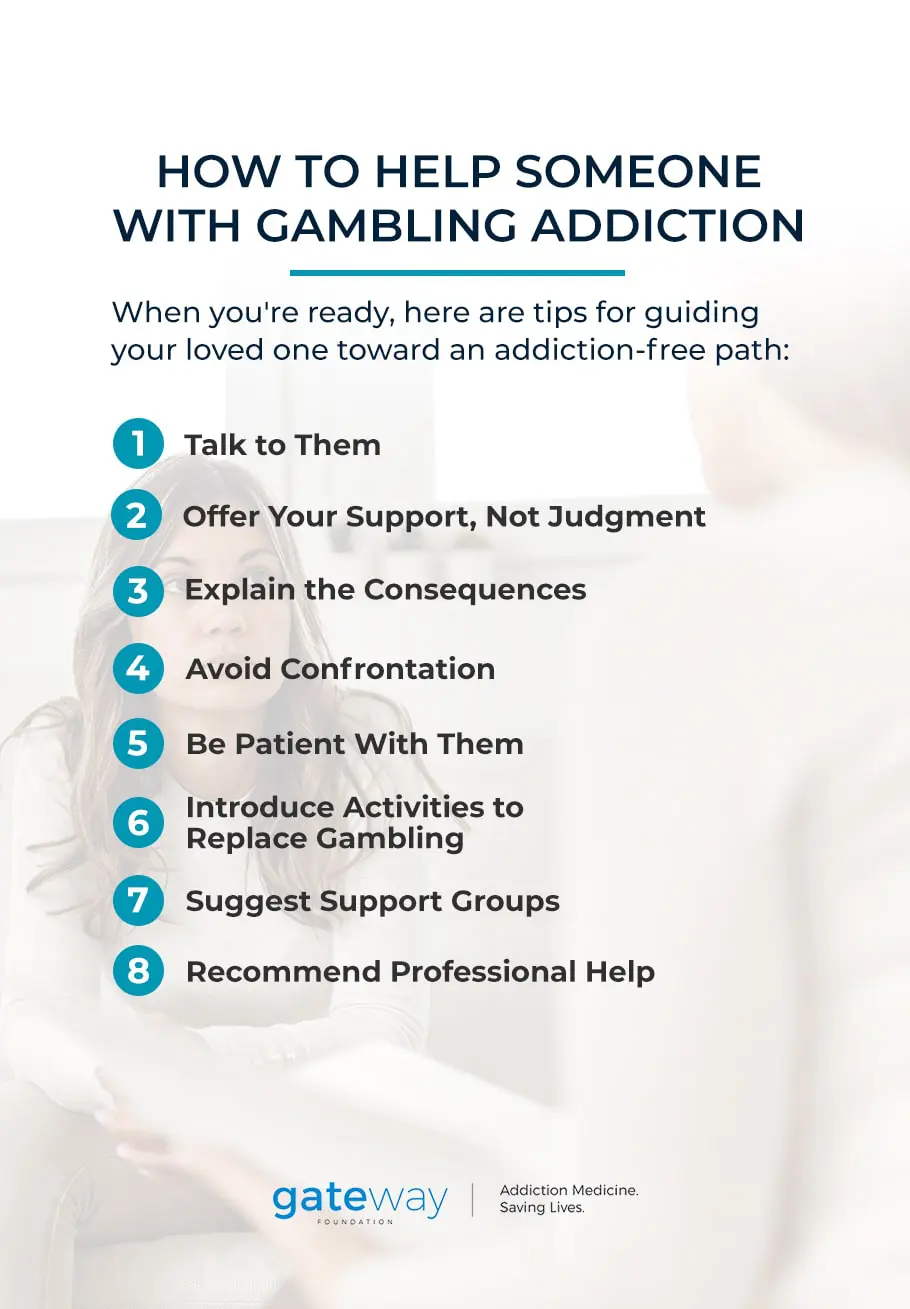
How to Talk to Someone About Gambling Addiction
It can be challenging knowing what to say to someone who’s having problems with gambling. Often, they might not even recognize their addiction or convince themselves they have everything under control when they don’t. If you’re worried about a loved one’s gambling issue, here’s how to approach the topic with them:
- Let them know you care: When talking to someone about their gambling, it’s crucial that they know you are coming from a place of care. Speaking calmly and letting them know you are only bringing up the topic to help might make it more likely that they open up and talk honestly. That way, you can come up with a plan together.
- Avoid criticizing: It’s also essential that you are empathetic and understanding when discussing your loved one’s gambling. Avoid saying anything that might come across as critical to prevent confrontation or your loved one from shutting down. It’s also important not to interrupt, which may make them feel defensive.
- Use “I” statements instead of “you”: Explaining how you feel might help your loved one lower their defenses so you can have an open discussion. Try to speak about yourself using “I” statements rather than “you” to avoid sounding accusatory.
Before talking to your loved one, plan what you’ll say using the above advice. For instance, you might tell them you care about them and feel worried about their gambling. Let them know you love them and want to help in any way you can. Once you’ve started the conversation, be patient and listen to what they say without being judgmental. Keeping calm and empathetic without making excuses for their gambling is also crucial.
How to Help Someone Addicted to Gambling
As someone close to a person with a gambling disorder, you may feel angry, hurt, or sad. Your feelings are understandable, and your loved one’s addiction is not your fault. Before you devote time and energy to helping your loved one, ensure you’re practicing self-care and addressing your own emotional needs. It’s easier to help another person when you’re feeling healthy yourself.
When you’re ready, here are tips for guiding your loved one toward an addiction-free path:
1. Talk to Them
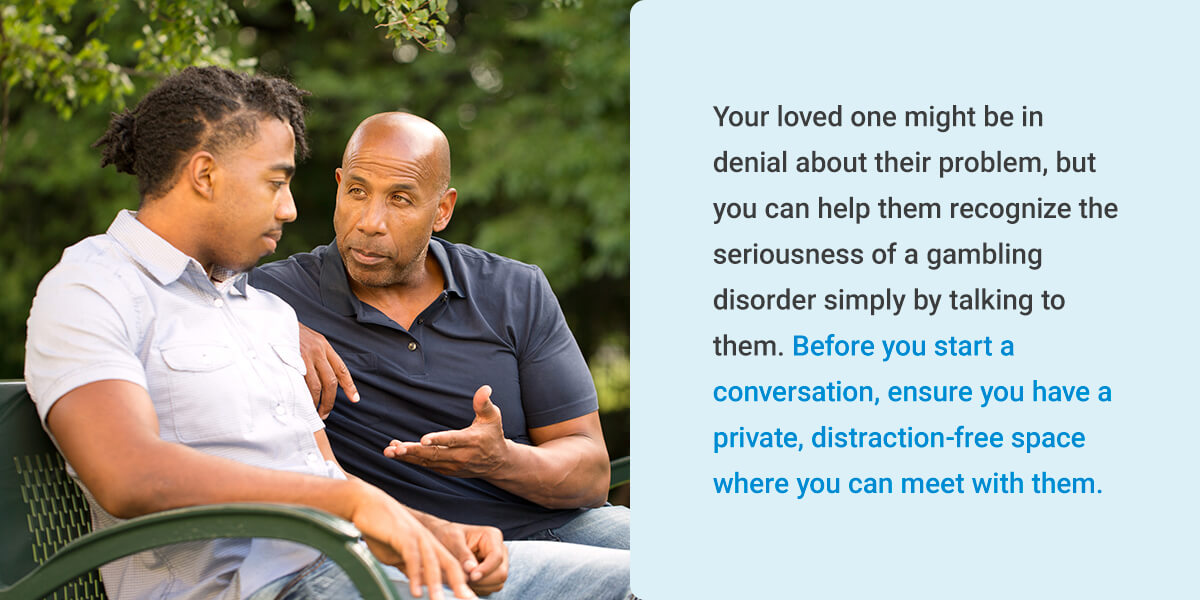
Your loved one might be in denial about their problem, but you can help them recognize the seriousness of a gambling disorder simply by talking to them. Before you start a conversation, ensure you have a private, distraction-free space where you can meet with them. Also, be sure you’ll both have enough time to discuss each other’s concerns and issues. The person must have time to share their side of the story to feel comfortable opening up.
Here are tips for approaching your loved one and communicating your concerns based on your relationship:
- Spouse: Being married to someone who has a gambling disorder is extremely difficult, especially if you have joint accounts. If you wish to work on your marriage, it’s crucial to approach your spouse as soon as possible. Be ready to discuss how their addiction impacts your finances and urge them to get help. Let them know you’re serious and that you will no longer enable their behaviors.
- Parent: If your mom or dad has a gambling addiction, you may feel as if you lost your parent in addition to worrying about their financial situation. Although it can be hard to talk to a parent about their spending habits, it’s OK to let them know you’re concerned. Assure them you want to help them seek treatment for their addiction, and consider asking to manage their bills.
- Child: As a parent, your approval or disapproval matters to your child, regardless if they are young or grown up. Talk honestly with your child about problem gambling and its consequences, and let them know you’ll help them find treatment. Remind your child that you still love them despite their addiction, and you’re there for them every step of the way.
- Friend: It can be painful to watch a close friend lose everything to gambling, and it might make you feel helpless. Your relationship might also be at stake if they’ve lied to you due to their addiction. If you think your friendship is worth keeping, meet with your friend to express your concerns and suggest they get help. Your honest words might be enough to encourage them to change.
Regardless of your relationship with the person, you might start the conversation by asking them if they think they have a problem with gambling. After they respond, tell them you’re concerned and explain why you’re worried. Aim to suggest a solution rather than tell them what to do. For example, you might ask them if they’re comfortable meeting with a counselor to address gambling.
2. Offer Your Support, Not Judgment
Assure your loved one that you fully support them with overcoming gambling addiction, and do your best not to sound judgmental. One way to avoid sounding judgmental is to start sentences with “I” rather than “you.” For example, you might say, “I’m concerned about your spending,” instead of, “You spend too much money.”
You could also tell the person directly that you will try not to judge them and ask them to let you know if you act judgmental. Be sure to ask them questions to show you want to understand what they’re going through and wish to help.
3. Explain the Consequences
Using a calm and objective tone, explain the social, financial, mental, and physical impacts of gambling. These may include:
- Debt or bankruptcy: It’s estimated that people with a gambling problem are three times as likely to report being in debt than those who don’t gamble. It’s also estimated that up to 20% of people who engage in problem gambling declare bankruptcy.
- Physical and mental health issues: Compulsive gambling is associated with a vast range of health issues, including heart conditions, high blood pressure, headaches, stomach disorders, and cardiac arrest. Gambling addiction is also associated with depression, anxiety, substance use disorder, and increased suicide risk.
- Relationship distress: Of those concerned about a loved one’s addiction, 96% said that gambling harmed their relationship.
Explain to your loved one that uncontrolled gambling can also lead to stealing, lying, violence, and jail time.
4. Avoid Confrontation
If you’re feeling angry or hurt about your loved one’s gambling, wait until you feel calm to approach them. Your friend or family member might get defensive when you mention gambling, so it’s crucial to have control of your emotions before you start a conversation to avoid a fight.
If your loved one gets angry for bringing up the problem or refuses to talk about it, you may want to walk away. Let them know you’re available to talk when they’re ready and try to have the discussion again at a later time.
5. Be Patient With Them
Overcoming addiction takes time and effort. Your loved one may have underlying issues that need to be addressed before they can recover. They also need to feel ready to change, and this, too, may take some time.
Be patient with your loved one, and resist the urge to rush them through recovery. If you try to force them to make changes they aren’t yet ready for, they could become more stressed. They might gamble as a way to cope with this stress.
6. Introduce Activities to Replace Gambling
Many people gamble to relieve boredom, unwind after a stressful day, escape life’s problems, or socialize with others. Some people gamble in the hope of solving money issues. You can help your loved one replace gambling with positive activities by suggesting new ways to relax and overcome boredom. Here are a few ideas:
- Get an adrenaline rush: For some people, gambling is a way to feel excited. Suggest trying a challenging sport or hobby to provide an adrenaline rush without the need to gamble. Activities like rock climbing, zip lining, or mountain biking can all add excitement to life.
- Beat boredom: Encourage your loved one to pursue a new hobby or explore something they’ve always been passionate about. They might enjoy taking an art class, learning how to play an instrument, or joining a gym. You can also spend time with them to help them keep busy. Watch movies, try new recipes, or go for walks together.
- Socialize: If your loved one gambles as a way to socialize, suggest healthier alternatives. They might talk to a counselor for help overcoming shyness or join a local social group. Maybe they could take a public speaking class to help them conquer their fears.
- Relieve stress: There are many ways to relieve stress that don’t involve gambling, such as meditating, exercising, deep breathing, and journaling. Consider joining your friend or family member in a stress-relieving activity so you can both enjoy the benefits.
- Solve money problems: If the person gambles to solve money problems, suggest they meet with a credit counselor. Credit counselors are trained to help people manage money and debt.
7. Suggest Support Groups
A person with a gambling disorder might feel isolated, lonely, and misunderstood. By joining a support group, your loved one can share their fears, struggles, and dreams with people who understand what they’re going through in a safe environment. A support group also provides opportunities to learn effective coping strategies for dealing with triggers.
At Gateway Foundation, we offer 12-step meetings, group therapy, alumni events, and other resources to ensure our patients never feel alone with addiction — during and after treatment.
8. Recommend Professional Help
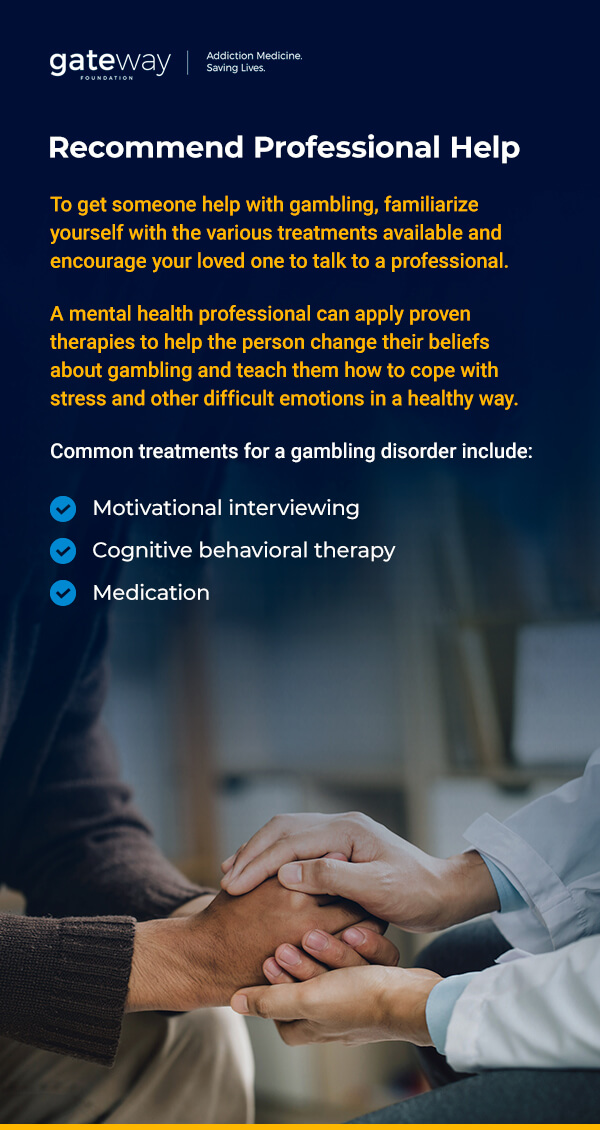
To get someone help with gambling, familiarize yourself with the various treatments available and encourage your loved one to talk to a professional. A mental health professional can apply proven therapies to help the person change their beliefs about gambling and teach them how to cope with stress and other difficult emotions in a healthy way. They can also treat any underlying mental health issues that contribute to addiction. Common treatments for a gambling disorder include:
- Motivational interviewing: If your loved one isn’t sure if they’re ready to change, motivational interviewing might help. With motivational interviewing, a counselor works with the person to explore their uncertainty and find reasons to recover. This counseling technique can help your loved one identify the most important things in their life that they aren’t willing to risk losing.
- Cognitive behavioral therapy: Cognitive behavioral therapy (CBT) is a popular form of talk therapy. With CBT, the counselor helps the patient change unhealthy thoughts, behaviors, and irrational beliefs related to gambling. They also teach the patient how to resist an urge to gamble and deal with triggers. CBT can help a person solve problems caused by gambling, including issues with relationships, school, and work, as well.
- Medication: Compulsive gambling often co-occurs with mental health problems like depression, bipolar disorder, anxiety, obsessive-compulsive disorder (OCD), and attention deficit hyperactivity disorder (ADHD). If your loved one is experiencing a co-occurring disorder, medications like antidepressants and mood stabilizers can help decrease the urge to gamble.
How to Help Yourself, Too
Gambling addiction is hard on family and friends as well. It’s crucial that you care for yourself during this time and set healthy boundaries if you are close to someone with a gambling addiction. Here are some tips for taking care of yourself and your family:
1. Don’t Blame Yourself
First, you must know you are not to blame for your loved one’s addiction. The only person in control of the situation is the person who gambles, and it’s impossible to stop or control their habits. However, you can take charge by changing your own situation. Care for yourself while gently encouraging your loved one to get help. Support them, but don’t take on their burden. Gambling can cause relationship strain, and attempting to control the situation can impact your mental health.
2. Protect Your Finances
Gambling can impact your finances, making it crucial to protect yourself and avoid debt. If you have a partner with gambling problems, you can set financial boundaries with the following steps:
- Set a family budget.
- Carefully track family spending.
- Manage family finances until the gambling is under control.
- Agree on the amount of cash your partner can have so they aren’t tempted to gamble.
- Open separate bank accounts.
- Open bank accounts that require signatures for withdrawals.
- Put valuables in a safety deposit.
- Remove your name from shared credit cards.
- Cancel overdrafts on bank accounts.
It’s also helpful to get legal advice to understand your rights in your relationship. Think carefully before offering to help someone financially and keep valuables and cash out of sight.
3. Take Care of Your Health

When someone close to you is addicted to gambling, it can place immense strain on the relationship. While your partner is likely faced with strong emotions like stress, depression, and grief, it’s crucial to recognize how addiction can also impact your health.
Eating a healthy diet and getting regular sleep and exercise can improve physical and mental health. Exercising releases natural feel-good hormones like dopamine and endorphins, which can combat depression. At the same time, getting at least six to eight hours of sleep a night can improve your well-being and resilience to stress.
You might work on your mental health through meditation, yoga, or deep breathing. These activities can help you identify your stress and accept your emotions without judgment, promoting better mental health.
4. Focus on Your Family
Gambling addiction also places stress on families. If your partner is dealing with a gambling problem, take the time to focus on your family. Let your children know they can turn to you if they feel confused, angry, depressed, or isolated. While they may not express their feelings, parents that engage in harmful gambling behavior can have a significant impact on their children.
In extreme cases, gambling can lead to financial problems, causing children not to have enough to eat or be neglected. Older children might be tasked with more mature responsibilities, like caring for younger children. Addiction can also lead to children witnessing family arguments, tension, family violence, or breakdown — all of which can immensely impact their mental health.
To support your children emotionally, encourage them to discuss their feelings when they are ready to do so. Let them know they are not responsible and try to keep them engaged in family activities and their favorite hobbies. Acknowledge that their parent’s gambling behavior is the problem, not the person themselves. That way, you can reduce confusion and promote emotional balance in the family.
5. Set Healthy Boundaries
Often, the best way to help a gambler and yourself is by establishing healthy boundaries. Learn how to communicate your limits and stick to them when things get tough in your relationship. Here are some examples that families and spouses might consider with gambling issues:
- Financial: It’s crucial that you don’t pay off a gambling debt or lend the person money. Setting this boundary can prevent you from enabling the behavior or causing financial harm to your family. You might also set up separate bank accounts and request transparency with spending.
- Emotional: You might request that the gambler find a professional or trusted friend to talk to besides you when you need to prioritize self-care.
- Gambling: It makes sense that you might no longer join the person in gambling or accommodate them when they have urges. For example, that might involve not sharing your laptop or driving them to the casino. You can also prevent enabling by avoiding places that remind them of their gambling when you spend time with them.
- Relational: In a close relationship, you might request more honesty from the gambler or negotiate an equal balance regarding housework and financial responsibilities. You might also physically distance yourself from the relationship or step away temporarily if things become too stressful.
6. Reach Out for Support
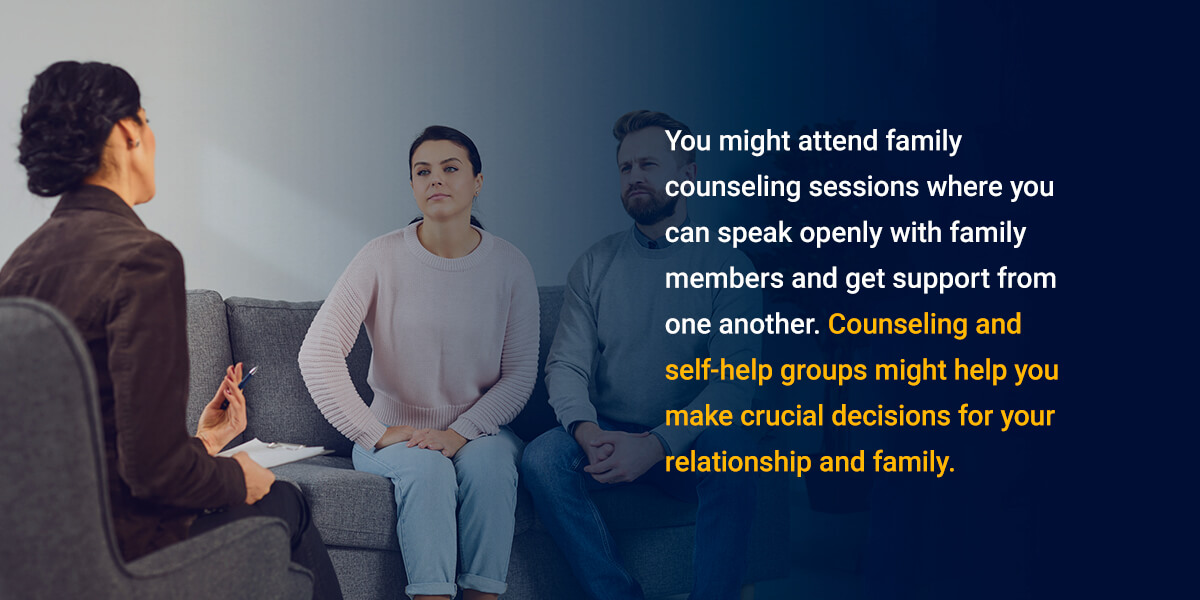
People close to problem gamblers can often feel isolated, making it helpful to seek support from trusted friends or go to a professional. You might attend family counseling sessions where you can speak openly with family members and get support from one another. Counseling and self-help groups might help you make crucial decisions for your relationship and family. They can also help with feelings like sadness, anxiety, and anger.
Building a support system and spending time with others can relieve stress. You won’t need to discuss your concerns if you don’t want to. You might just rely on friends when you need a distraction from the stress and to prevent yourself from getting consumed by your loved one’s gambling. Maintain your friendships, continue your interests, and participate in fun activities to care for your mental and emotional health.
Contact Gateway Foundation for Help With a Gambling Problem
Overcoming a gambling addiction is hard work, but there are reasons to be hopeful. With your love and support, you can help your friend, spouse or family member feel ready to overcome a gambling disorder and start anew. Plus, you don’t need to support them alone. At Gateway Foundation, we can guide you and your loved one through every step of their recovery and provide long-term support.
If you’re concerned about a treatment program interfering with your loved one’s job or responsibilities at home, know that we offer flexible outpatient services. With outpatient treatment, your loved one can receive motivational interviewing, CBT, and other counseling methods to meet their needs. Our goal is to help our patients heal and get back on track without giving up their lives.
If your family member, spouse, or friend requires 24/7 support, we also offer residential treatment programs at our locations in Illinois. Not sure what your friend or family member needs? We can help you determine the best level of care for your loved one. Please contact us today to learn more about our programs and services for gambling disorders.

